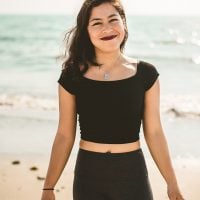View this post on Instagram
I recently asked the following question on Elephant Journal’s Facebook page:
How was love expressed in your childhood?
The British psychologist and earliest pioneer of attachment theory, John Bowlby, defined attachment as the emotional bond we form with another person as a product of a learned, evolutionary process.
Bowlby concluded that through spending hours observing the separation anxiety and stress reactions children exhibited when they were separated from their primary caregiver, usually a maternal figure.
As a result, he proposed that attachment is a learned, evolutionary process based on a set of behavioral and motivational patterns. Because the caregiver feeds the child and provides them with warmth, protection, and predictability, the child, eventually, becomes attached to the mother. But when the child is frightened or separated from their caregiver, they will seek them out for proximity, comfort, and care.
Further research argues that healthy attachment is detrimental in children’s early development for them to acquire the linguistic, cognitive, and emotional skills to articulate their feelings, needs, and desires later in life.
So, back to my Facebook question…
I personally believe that our world today is witnessing an epidemic of a “lack of love” accompanied by a great hunger to feel seen, accepted, held, and validated for who we really are instead of whom we believe the other person thinks we should be in order to be worthy of their love.
Many of us are also reincarnating the stories of our childhood, whether within the confines of childhood trauma—where we might have grown up among one or two abusive caregivers or a history of mental illness—or with a good enough parent.
Our nervous system coupled with our early experiences becomes wired to seek familiarity within our romantic relationships as well, because it is conditioned to cope with the predictability, or lack thereof, we’ve witnessed from our caregivers.
Eventually, each one of us falls under one or more categories of the main attachment styles: secure, anxious, avoidant, or disorganized—the latter being a recurrent pattern among people with a history of complex trauma.
Perhaps, this also partially explains why some of us get swallowed into a loop of abusive or emotionally unavailable relationships, where we might mistake the difficulty of abuse or neglect we’ve endured in our childhood with love and affection. Been there, done that!
According to the Swiss essayist and philosopher, Alain de Botton:
“We think we’re out to find partners who will make us happy, but we’re not. We’re out to find partners who will feel familiar.”
He further elaborates why some of us reject kind, loving partners over emotionally unavailable and avoidant ones, “We are not really in a quest to be happy. We are in a quest to suffer in ways that feel familiar.”
Perhaps it is a sad realization to feel as though our wiring and early experiences—both of which we had no conscious control over—are working against us. We may even realize that we are trapped in an old, familiar wound. But that realization alone might not be enough to break the cycle of familiarity and help us move forward, or to make better choices.
I know I’ve spent countless years feeling trapped while asking the same question, “Why does the ’emotionally unavailable’ person keep appearing in my life?”
While re-visiting the question I had proposed earlier, here are some of the responses I got. Some were truly heartbreaking:
“Sadly it wasn’t. But I have more than made up for it with my own family.” ~ Jill Hunt
“Music. My mom isn’t one to talk to about her feelings much, but every once in a while she’d play Forever Young by Rod Stewart. Or she’d play Ooh Child by Five Stairsteps. I know how much she loved me by her playing those songs; I felt it. Music still bonds us and we have a great relationship. My stepdad would cry and look me in the eye and tell me how much he loved me. I have the best of both worlds. I grew up with so much love and I’m so thankful for that. I have very good parents and I’m blessed to come from such strong people.” ~ Syd Pequano
“It wasn’t!” ~ VJ Hohmann
“Seeing dad show up for PTA meeting in my childhood days. I was raised by him alone and the little he did made me feel so loved, especially to know that my parent came just like others’ came. He had a busy work schedule but never missed any school program that needed his presence.” ~ Augustine Ofori GraceMade
” From being sexually abused by a biological father on a weekly basis to a mother ignoring it. She used to say, ‘Better he bothers you than me.'”
“With food…it wasn’t until I met my stepdad at 14 that I saw what romantic love was supposed to look like.” ~ Julia Brown
“There was no love at all. I was physically and emotionally abused by the demons I was living with called a father and a step mum. They ruined my life but I am healing gradually.”
“My dad would leave treats under my pillow and I knew it was gonna be a good day whenever I found them. I still miss that!” ~ Rubyisha Sheikh
“My sister took custody of me and our younger sister when we were seven and eight years old so we wouldn’t have to go to foster care. She was 18 and newly married and took on a huge responsibility to protect us.” ~ Elaine Balch
“Baked goods, dresses sewn by my grandmother, a roof over our heads, three meals a day, and clean clothing.” ~ Marny Martin-Beanum
While we might not be able to go back in time and change the narratives of our past, we are still empowered every moment of each day to choose differently by adding new chapters into our storyline. That includes the choice to stay put in our familiar zone, which isn’t a bad decision if that’s what we truly want for ourselves. Either way, the choice is ours.
We are relational beings who are connected and shaped through an intricate web that includes our biology, early experiences, memories, social circumstances, and environment.
But most importantly, our ability to relate with one another is determined by not only how we were once loved as children, but the kind of genuine love we believe we’re worthy of based on how we love ourselves, first and foremost.
Instead of familiarity and codependency, let’s try (at least) to lead from a place of empowerment and mindful choice.
We are all worthy of great love.
~







Read 14 comments and reply